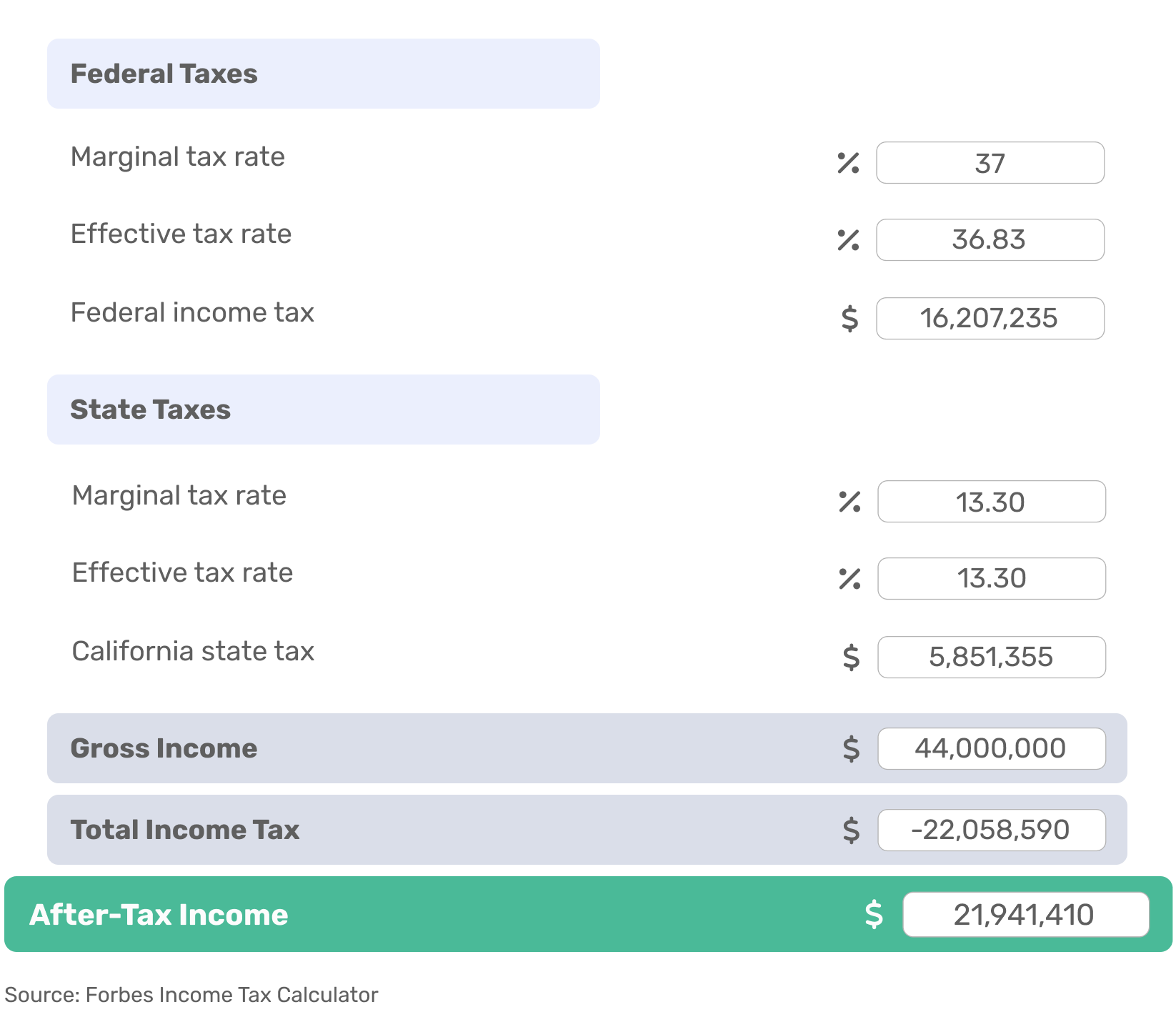Lebron James' Taxes Under the New Plan
Updated February 2nd, 2023
Reading Time: 3 minutes
Do you know what tax bracket do you fall under this year? With the new tax changes in 2023, we decided to figure out how one of the world’s biggest athletes, Lebron James’ taxes will change.
Lebron James is considered by many to be the best basketball player in the world. Not only is he a 4-time NBA champion, but he single-handedly put an entire city on the map (no offense Cleveland). So it’s not surprising that he’s worth an estimated $1B and is expected to make at least $44 million in 2023 from his NBA salary alone.
With the tax changes being implemented in 2023, we thought about breaking down what Lebron James’ taxes will be for this year. Any guesses?
Start With A Few Assumptions.
To make it easy, let’s only look at his modest $44 million NBA salary and not the additional $55+ million he makes each year in endorsements. Let’s assume he files jointly with his wife and pays state taxes in California. Lastly, since it’s impossible to know how much he deducts from his gross income accurately we are going to assume he has a standard deduction of $25,900.
Lebron’s After-Tax Income:
Including a standard deduction of $25,900. This is what Lebron James’ taxes would potentially look like:


Under this calculation, the estimated amount Lebron will owe in federal and state taxes is the Total Income Tax: $22,058,590.
In Case Lebron Itemizes his Deductions:
The state and local tax (SALT) deduction allows high-income filers, such as Lebron, to deduct local tax payments. These types of deductions are beneficial in high-tax states such as California. Lebron is both a high-income filer and a resident of a high-tax state. Higher-income taxes make tax deductions more valuable, so let’s dig deeper into what this means.
If taxpayers don’t choose the standard deduction, they can itemize their deductions and deduct taxes on property, income, and sales expenses in specific states. Since Lebron lives in California, he would probably deduct state and income taxes (as they exceed sales taxes). According to The Tax Foundation, “The state and local tax deduction disproportionately benefits high-income taxpayers, with more than 88 percent of the benefit flowing to those with incomes in excess of $100,000.”
Moreover, his real estate portfolio makes him subject to three states: Ohio, California, and Florida. For Lebron to score in the tax field he would have to create a tax strategy (he probably does this with a financial advisor) that avoids him from owing crazy amounts to the government and maximizing his earnings.
Important Context: The Shooting Guard of Taxes
On the playing field, many try to stop Lebron with shooting guards, point-guards, or other defensive strategies that prevent him from scoring. When it comes to taxes, this is a reduction in the SALT deduction. Starting in 2018, SALT deductions were limited to $10,000, which affects high-income filers the most. This means Lebron would think twice about standard deductions vs. itemized SALT deductions.
Standard deductions are fixed amounts subtracted from the adjusted gross income (the example we included takes standard deductions into account). For this tax filing year, the standard deduction for those who file jointly is $25,900. Score! The standard deduction, in this case, would be the three-pointer for Lebron since the amount is higher than the average SALT deduction amount.
Even though Lebron is unable to deduct his entire state, local, & property taxes with the new plan, he will save in federal.
How do Lebron James’ Taxes Compare to Yours?
The tax bracket you fall into is determined by your filing status and taxable income. However, you can lower your income tax bracket using tax deductions like those mentioned. There are various IRS tools online that help you calculate your bracket, standard deduction amount, and other important variables. Working with a financial advisor might be the best way to come up with a maximizing tax strategy. While Lebron trains to remain #1, you can plan to optimize your taxes and work to have them play in your favor, instead of against you.
Disclosure: This material provided by Zoe Financial is for informational purposes only. It is not intended to serve as a substitute for personalized investment advice or as a recommendation or solicitation of any particular security, strategy or investment product. Nothing in these materials is intended to serve as personalized tax and/or investment advice since the availability and effectiveness of any strategy is dependent upon your individual facts and circumstances. Zoe Financial is not an accounting firm- clients and prospective clients should consult with their tax professional regarding their specific tax situation. Opinions expressed by Zoe Financial are based on economic or market conditions at the time this material was written. Economies and markets fluctuate. Actual economic or market events may turn out differently than anticipated. Facts presented have been obtained from sources believed to be reliable. Zoe Financial, however, cannot guarantee the accuracy or completeness of such information, and certain information presented here may have been condensed or summarized from its original source.